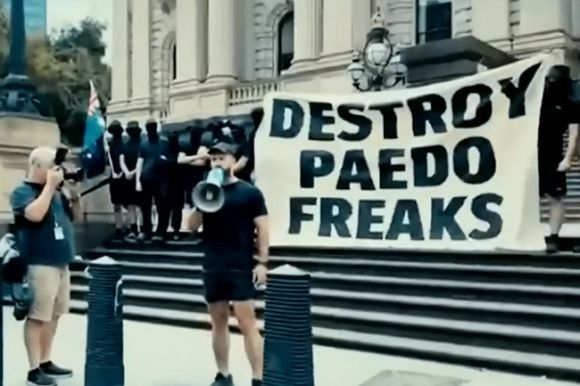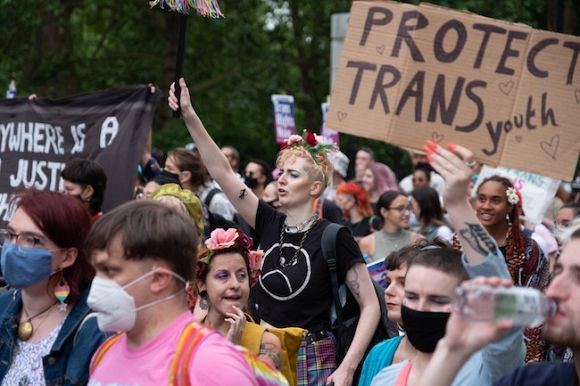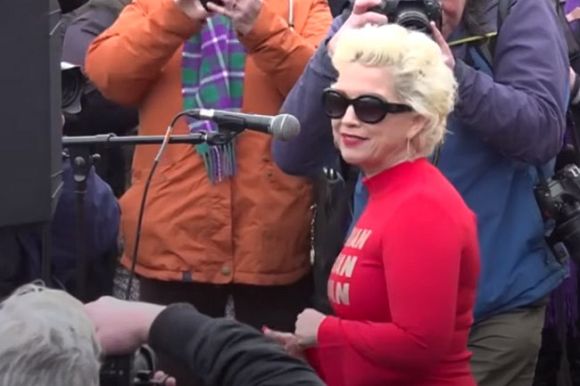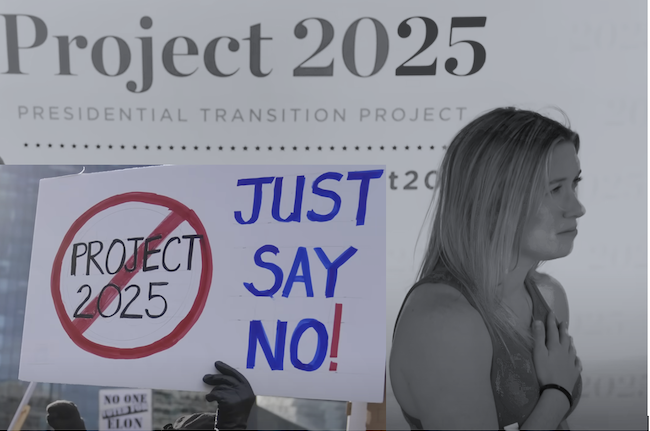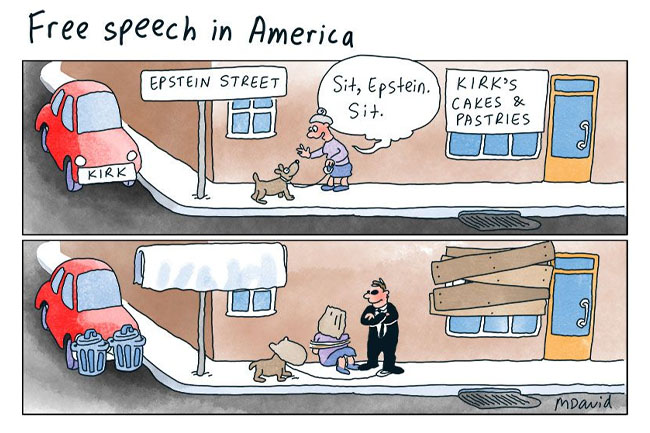ABC's Media Watch has stirred controversy by bothsiding the fight for trans rights, claiming the importance of reporting differing points of view. Dr Victoria Fielding reports.
*Also listen to the audio version of this article on Spotify HERE.
IN 2017, during a White supremacist rally in Charlottesville, Virginia, a young woman was murdered when a White supremacist purposely drove his car into a crowd of people peacefully protesting White supremacy.
In response to this incident, then-President Donald Trump famously said:
“You had some very bad people in that group, but you also had people that were very fine people, on both sides.”
And:
“I think there is blame on both sides.”
Joe Biden responded to this statement in his video launching his bid for president in 2019, saying:
“With those words, the President of the United States assigned a moral equivalence between those spreading hate and those with the courage to stand against it.”
This same false moral equivalence, also referred to as bothsidesism, was on display in ABC’s Media Watch story, ‘Transgender TERF war’, about anti-trans columnist and journalist, Julie Szego, losing her job at The Age.
Bothsidesism refers to presenting different perspectives in a notional debate as if they are equally valid, have the same moral basis, have equally strong arguments, or are equally problematic.
There are two major problems with bothsiding of anti-trans people with trans people. It suggests trans people who are victims of hate are no different than those who hate and discriminate against them. It also downplays or ignores the immorality presented by anti-trans arguments, and suggests these views are legitimate and valid when they are not.
Szego has made her anti-trans views clear by arguing that trans rights should not overcome “sex rights”. This is a common trope of trans-exclusionary radical feminists (TERFs) who argue that trans women are not real women and should not have the same rights as cisgender women and girls.
Media Watch host Paul Barry acknowledged Szego’s anti-trans views by saying:
“She’s concerned about gender self-ID laws in Victoria, which allow someone born male to become female via a stat dec, and thereby have access to women’s bathrooms, change rooms and sports.”
In other words, Szego doesn’t want men to be able to become trans women. She believes trans people shouldn’t exist and she does not want trans women to have the same rights as women, such as access to women’s spaces.
This anti-trans information was presented by Barry as if it was entirely legitimate. Barry did not mention the Sex Discrimination Act which ‘makes it unlawful to treat people less favourably than another person in a similar situation because of their sexual orientation, gender identity or intersex status’.
Even more worryingly, there were places in the report where Barry appeared to subtly take Szego’s side. He did this by suggesting she was a brave victim of the transgender “war” and that her firing was unjustified.
He said:
“Szego was cancelled after a row about a news piece she’d penned for the paper.”
Barry also failed to scrutinise the accuracy and balance of Szego’s reporting on “trans issues”, even when also reporting that the pieces she wrote “faced pushback in the editing process with attempts to insert trans activist talking points into her copy, and then backlash on publication”.
Barry apparently had no interest in the fact Szego had written pieces about transgender people without giving them a right of reply. He also did not explore what the backlash was about, implying it was not important or justified.
By referring to Szego as “cancelled”, Barry also misrepresented the circumstances of her leaving The Age. As Szego explained, her then-editor fired her when she took a “swipe” at them in a tweet after her editor refused to publish one of her anti-trans pieces — which is, of course, his right as her editor.
After publishing the piece herself, she first tweeted:
‘If you want to know why this piece was rejected, you’ll have to ask the editor.’
And then:
‘...a committee of woke journalists redacting words they deem incendiary, such as “male”.’
Szego said she received a text message from her editor saying:
“...he can’t have journalists, ah columnists, disparaging the paper and that he won’t be commissioning any more columns from me.”
Her editor, Patrick Elligett, said there was a perception that Szego
“...had become too close to an activist community on gender issues. In my view, that disqualified her from writing news on the topic.”
Still using the victim frame for Szego, Barry gave her the opportunity to argue she was not an anti-trans activist. This is despite her activism being evident in her writing and her obsession with continuing to write anti-trans pieces even after she knew “people got very upset” about it “both inside and outside the paper” and “a person from an LGBTQ [sic] organisation was called in to give a talk to the staff on avoiding harm in their reporting”. Szego – and Barry – apparently aren’t interested in avoiding harm.
Szego also said she attended the Melbourne Let Women Speak rally in March to do journalism. Barry let his mask slip a little when he suspiciously described this rally as “pro-women, or anti-trans-rights”, suggesting he accepted the women who attended were legitimately defending their sex through anti-trans activism. The truth is, women attended to protest against trans people existing.
Barry also gave implied credibility to anti-trans protesters by describing how at the rally, “some Right-wing crazies muscled in and gave the Nazi salute”. This downplayed the fact that these “Right-wing crazies” share the same view on transgender people as anti-trans protesters, which is, of course, why they were there.
Barry finished his piece by saying:
“Clearly, covering transgender issues is difficult territory. But denying women a voice or spiking stories that will cause a fuss is surely not the answer. In a debate where both sides accuse the other of extremism, it’s the media’s duty to be an honest broker, treat both sides with respect and not be scared into silence.”
With this statement, Barry implied that he believes there is something extreme about trans identity and trans activism, which was a very telling insight.
Although Jackie Turner, Director of the Trans Justice Project, was quoted in the piece, she had nowhere near as much opportunity to speak as Szego. Her comments were used only to defend trans people.
For example, she said:
“...many of the sources that Szego references in this piece are ideological, misleading, or explicitly anti-LGBTQIA+.”
In a subsequent tweet, Turner said she gave Media Watch ‘evidence and research’ that ‘showed how anti-trans disinformation was being used to attack the trans community, our rights and access to health care’. This information wasn’t aired and apparently did not encourage Media Watch to scrutinise Szego’s pieces further.
In response to the episode, the Trans Justice Project wrote an open letter to Media Watch, asking for an apology. In the letter, they criticise the show for failing to provide factual analysis of ‘medical consensus around gender-affirming care’, platformed ‘fringe conspiracy theories, discredited science and links to known anti-trans disinformation groups’, did not provide adequate political context about discrimination against the trans community, and overall fuelled ‘anti-trans stigma’.
In a response to Crikey’s request for comment on the segment, Media Watch’s executive producer, Tim Latham, said they stand by the story and believe it’s important to air ‘differing points of view’. At the time of writing, Media Watch has not responded to the Trans Justice Project.
Media Watch prides itself on critiquing other media programs and highlighting where journalists have got it wrong. It needs to spend some time reflecting on what went wrong in ‘Transgender TERF war’.
Hate is the opposite of defending against hate. Misinformation is the opposite of facts. There are not “very fine people, on both sides” of this issue. There are haters and victims of hate. When the two are given false equivalence, it is hate which comes out the winner.
*This article is also available on audio here:
Dr Victoria Fielding is an Independent Australia columnist. You can follow Victoria on Twitter @DrVicFielding.
Related Articles
 This work is licensed under a Creative Commons Attribution-NonCommercial-NoDerivs 3.0 Australia License
This work is licensed under a Creative Commons Attribution-NonCommercial-NoDerivs 3.0 Australia License
Support independent journalism Subscribe to IA.




